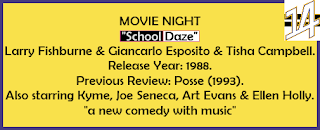Cast:
Laurence Fishburne (Vaughn "Dap" Dunlap), Giancarlo Esposito (Julian "Dean Big Brother Almighty" Eaves), Tisha Campbell (Jane Toussaint), Kyme (Rachel Meadows), Joe Seneca (President Harold McPherson), Ellen Holly (Odrie McPherson), Art Evans (Cedar Cloud), Ossie Davis (Coach Odom), Bill Nunn (Grady), Branford Marsalis (Jordan), Kadeem Hardison (Edge), Spike Lee (Darrell "Half-Pint" Dunlap), Darryl M. Bell (Big Brother X-Ray Vision), Joie Lee (Lizzie Life), Alva Rogers (Doris Witherspoon), Jasmine Guy (Dina), and Samuel L. Jackson (Leeds) Produced, Written, and Directed by Spike Lee (#1255 - Do the Right Thing, #1543 - Inside Man, #1643 - Malcolm X, and #1976 - She's Gotta Have It)
Review:
I don't pretend to know the legacy of certain films, but I do have an interest in the film that comes after one makes their debut feature, particularly if it happens to be one from a director as prominent in black cinema as Spike Lee. School Daze (1988) is curious not only as one released two years after She's Gotta Have It (his formal debut after his student films and shorts, remember) that was followed almost immediately by his third effort in Do the Right Thing one year later. This film was shaped by his experiences that he had when attending Morehouse College (a historically black college in Atlanta) in the late 1970s. Island Pictures, which had distributed Lee's first film, had planned on doing this film as well, but wavering issues in the budget (which finished above $6 million) eventually led to Columbia Pictures acquiring it. Strangely, a movie that talks about sororities and fraternities had a bit of a tough task in finding a place to shoot the film, which included Morehouse (irony?) before Atlanta University was utilized. Apparently, the film had different housing for certain groups of the cast, which led to an unscripted (and filmed) confrontation at a "stepping show". The movie was a modest hit with audiences.
Every so often I have to remember that films of a certain age could actually talk lightly about issues that mattered that seem distinct from now, which starts pretty quickly with a film that starts with someone trying to do a protest about divesting from South Africa. Of course, what really matters for this film is how people treat each other in the facets that come in... colleges and dorms. Within the divides that comes from people of the same color and distinct privileges is a film that also happens to have a few music numbers. I personally don't have any experience with fraternities, but I think we can understand that divides between certain groups and classes is not always black and white as it might seem. Of course, it seems like a fable one tells to try and get people to wake up (almost as if they were in a... daze) to the issues that are mired in the muck beyond arguments over hair. One can say progress has been made in a certain place, but how much of what we say is progress as opposed to being lip service? I liked the movie fine, even though its 121 minute runtime does tend to make one desire the tiniest bit more from its ending, which almost seems to be direct but brief as possibly can be. Fishburne has all the confidence required in a film surrounded by apathy that isn't merely played as a martyr but one with his own biases and charms. The musical numbers are executed with varying effectiveness, but probably the best sequences of the film are in smaller moments. I especially like one scene involving Fishburne and his group going out into town to eat only to confront some locals (which is where Jackson appears briefly) that resent them in their own privileges, because if there is one thing to say about people, it is that there are people who will just look down on anyone who want better for themselves, even to the point of calling them a certain word and say that they'll be like them "just like us". Esposito makes an ideal wannabee with a total absence of awareness for anything but his own group for a distinct act of the public. His narrowmindedness strikes most of all, even with Campbell (and accompanying status in loyalty) right there on the divide of hair and sororities. Amusement is here and there in those selection of scenes for a movie not focused on showing the classroom (Davis having a scene in trying to motivate his football team is a real chuckler). At the end of the day, the black experience is one that cannot be thought as just simple to pin down for easy stereotypes, regardless if one is a college man or not. Living in apathy that just thinks about wallowing in where they are or just being content with a small piece of the action is just not enough when one could also wake up to what's around them. The film is mildly effective in its approach as a whole due to a game cast that makes Lee's second effort at least a useful curiosity to seek out on its own terms.
Overall, I give it 7 out of 10 stars.


No comments:
Post a Comment